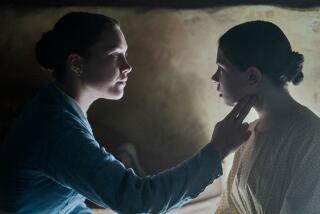An Arty Look at Asylum Life
- Share via
The prettiness of the stars in “Lilith” just about does the film in. Warren Beatty, playing a young psychiatric therapist, looks like a ramp model who wandered into a world of insanity. Jean Seberg, in the title role of his patient, can’t hide her gorgeousness no matter how thickly she’s swaddled in dowdy dresses.
Beatty’s acting doesn’t help in Robert Rossen’s 1964 picture; his performance is as blank and shallow as his blandly perfect features.
Seberg is another matter. A gifted actress, she turns Lilith into a study of mental turbulence equal parts sexual rapture and obsessive manipulation. Seberg’s the best reason to see this odd movie.
“Lilith” may be far from a perfect film, but it does fit the “Love and Madness” concept behind UC Irvine’s fall film series. “Lilith,” screening Friday night as the second installment in the program, is about the troubled love between Vincent (Beatty) and Lilith, and the madness it inspires.
The picture opens with Vincent entering the Poplar Lodge asylum, a worried pinch to his face. Vincent’s uneasiness and the vistas surrounding the institution are early giveaways to Rossen’s approach: His tone is moody, internalized, and his investigation of asylum life is more arty than hard-edged. Poplar Lodge is one tony place, with its own lake and lush, comforting surroundings; it’s a leap from the snake pits seen in other films about mental illness.
Vincent carries his own secrets, as does just about everybody else in “Lilith.” We know he’s an ex-soldier with physical and emotional wounds, but little else is explored, especially his hinted-at incestuous relationship with a now-dead mother. Lilith resembles her, so at least we realize his attraction to his patient is a complicated one.
Lilith is also a cipher. Beautiful and delicate, she occupies her own dream landscape complete with a secret language.
But she’s mercurial in the worst sense, shifting from a wan victim to an almost brutal woman fully aware of her sexual power over men.
We’re told something about a beloved brother who died when she was young, but almost nothing else of her past.
Instead, Rossen tosses out a lot of talk that amounts to a stew of basic Freudian jargon. The head doctor (James Patterson) also gets melodramatic, mouthing stuff like “They (the insane) are like fine china. They have been destroyed by their excellence.”
The film never really deals with Vincent’s unethical betrayal when he begins an affair with Lilith.
Rossen is really only intrigued by the impact Lilith has on Vincent’s own unstable psyche. He becomes as crazy as she, even more so by the movie’s violent conclusion.
“Lilith” is problematic, but it’s not boring. Although Rossen is vague in just about every passage, things happen that grab your attention. Lilith begins an affair with another female patient (we don’t know if it’s to incite Vincent or further show her sexual fixations), and Peter Fonda appears as a nervous tic of a suitor who just happens to be insane as well.
There’s also a bizarre jousting scene where Vincent uses lance and horse to seduce Lilith; these moments feature heaps of chaotic camera angles and speedy, erratic editing.
The always durable Gene Hackman even makes a gratingly effective appearance as the boorish husband of Vincent’s childhood love, played by Jessica Walter.
But the finest feature of “Lilith” is Seberg. The actress who thrilled the French New Wave with roles in “Breathless” (1960) and “Time Out for Love” (1961) exhibits tremendous reach.
The intelligence behind those sometimes helpless, sometimes malevolent eyes is compelling.
*
What: Robert Rossen’s “Lilith.”
When: Friday, Oct. 8, at 7 and 9 p.m.
Where: The UC Irvine Student Center Crystal Cove Auditorium.
Whereabouts: Take the San Diego (405) Freeway to Jamboree Road and head south to Campus Drive and take a left. Turn right on Bridge Road and take it into the campus.
Wherewithal: $2 to $4.
Where to call: (714) 856-6379.
More to Read
Only good movies
Get the Indie Focus newsletter, Mark Olsen's weekly guide to the world of cinema.
You may occasionally receive promotional content from the Los Angeles Times.










